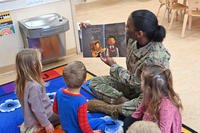Is your spouse deploying for the first time, or are you a new spouse of a military Reservist or National Guardsmen? If so, there are many programs to support you throughout the deployment cycle, from mobilization through the service member’s reintegration.
Guard and Reserve families may not have much time to prepare for deployment, so it's important to know the support and information resources in advance. Knowing as much as you can about the military, the deployment process, your benefits and the support available to you will help you manage the home front with strength and confidence.
Command communications
Your command leadership will distribute information to you as efficiently as possible, but be realistic about the availability and frequency of communications. Command may use several different methods to keep you and your family informed, including a unit website or answering machine, email, toll-free phone number, or automated multimedia communication systems.
Military family support websites
The Department of Defense (DoD) and each branch of the military Services provide online information for military families, including those in the Guard and Reserve. These websites will inform you about services, points of contact, links to additional sources of support, and opportunities to interact with other military families. For example, the Army Reserve runs http://www.arfp.org/index.phpwww.arfp.org/index.php designed to help Army Reservist families. They also operate a 24/7 assistance line known as "Fort Family."
If you are a National Guard family, register on the Joint Services Support site for information on resources in your state, online forums, e-learning opportunities, and local event calendars. This site also provides information and referrals on quality-of-life issues. If you are a military Reserve family, you can obtain information from the Joint Service Support site that will help connect you to local support resources.
Yellow Ribbon events and family readiness activities
Military commands typically host "yellow ribbon" events to help families prepare for and stay strong during and after a deployment.
Through the Yellow Ribbon Reintegration Program (YRRP), the National Guard and Reserve prepare service members and families for deployment, sustain them during deployment, and provide information and support to help with reintegration with families, communities and employers upon their return and release from active duty.
At pre-deployment events, you and the service member will learn about enrolling in the Defense Enrollment Eligibility Reporting System (DEERS), military pay, financial readiness, family-care plans, Tricare and other benefits. You'll also learn about family support through the military in such areas as education, counseling, child care and religious support.
Events during deployment provide information and outreach to family members to assist with the impact of separation and allow them to connect with other families. After service members return home, Yellow Ribbon activities help families reconnect and readjust with information on communication challenges, relationship stress, combat stress issues, Department of Veterans Affairs (VA) benefits, employment, and more.
You'll get information in briefings and group discussions and can ask questions. You'll also meet unit leaders, family support professionals, and volunteers who will be important resources during the deployment. Yellow Ribbon events are posted online here and here.
Knowing about and using the resources available to you is essential to family readiness. During a deployment, you may have financial or legal questions, need support for your children, be concerned about your emotional well-being, or just want to connect with other military families. Getting support early, before concerns become problems, will help you stay strong.
Military OneSource
This free twenty-four-hour service is available to all active duty, Guard and Reserve members (regardless of activation status) and their families. Consultants provide information and make referrals on a wide range of issues, to include helping military families navigate each stage in the deployment cycle. Free face-to-face, online, or phone counseling sessions are available. Call 1-800-342-9647 or go to www.militaryonesource.mil to learn more.
Family Assistance Centers
Family Assistance Centers (FACs) are located in every state to serve geographically dispersed military families. FACs provide information, outreach, and referrals to services in your community and serve all active and Reserve service members and families, not just the National Guard. To find the nearest FAC, use the Resource Finder at the Joint Services Support website.
Installation Family Support Programs
Immediate family members of active duty Guard or Reserve members are entitled to use services at military installations. Fleet and Family Support Centers, Marine Corps Community Services, Airman and Family Readiness Centers, and Army Community Service Centers offer a wide range of professional support services as well as information and referral to community resources.
If you live near a military installation, a visit to the Family Support Programs will give you an idea of the services available. The Service branch of the installation isn't important; installation family program professionals are used to serving all activated personnel and their families without regard to Service branch.
Your unit family support staff and volunteer network
Guard and Reserve commands have organized family support systems of staff and volunteers. Family Assistance Coordinators, Family Readiness Assistants, Family Readiness Officers or other designated family support specialists are your links to unit information and support.
Getting to know key staff and volunteers before your service member deploys can make it easier to ask for help later. Call the service member's unit to connect with these resources, and stay in touch during the deployment. If you move or get a new phone number, notify the unit points of contact so you won't miss out on important information and activities.
Find support for children
Here are some forms of support available to Guard and Reserve parents, children, or caregivers:
- Child care. You can get help finding and paying for child care that meets your needs. Operation Military Child Care is one of several partnership programs between the DoD and the Child Care Aware of America (formerly NACCRRA) to help military families find quality child care in their communities.
- Youth program opportunities. Our Military Kids, the National Military Family Association (NMFA), and Military Child Education Coalition (MCEC) all provide access to resources you can use to help your kids cope with the emotional aspects of having a deployed parent.
Seek community support
Families of Reserve component members deployed for the first time are often surprised to discover how many people in their community have some connection to a deployed service member. Ask neighbors, co-workers, school personne, or leaders in your religious organization if they know someone with a spouse, child, or significant other on active duty, and get in touch.
Mutual support is also available online. Searching the websites referenced in this article will help you find online military family discussion and support groups for both adults and youth. And look for support outside the military community as well. Above all, don't try to go it alone. Having a support system at home helps families avoid burdening their service members with worries that might distract them from the mission.
Get involved
Helping others can be an effective and positive technique when dealing with deployment. Unit family readiness groups and other programs rely on the voluntary efforts of family members to achieve their mission. Your group will have an important role for you to play in welcoming new members, planning social activities to bring families together, or providing support for others in need. Whatever your relationship to a service member or unit, you can join the group and offer your help. These groups need volunteers before, during, and after the deployment, but especially during down times when it's more of a challenge to keep families interested and involved.
As you focus on taking care of home and family during your loved one's deployment, don't forget to take care of yourself as well. Try to have realistic expectations of yourself, and keep in mind that family separations and deployment, offers a unique opportunity to nurture your own physical, emotional and spiritual well-being.











